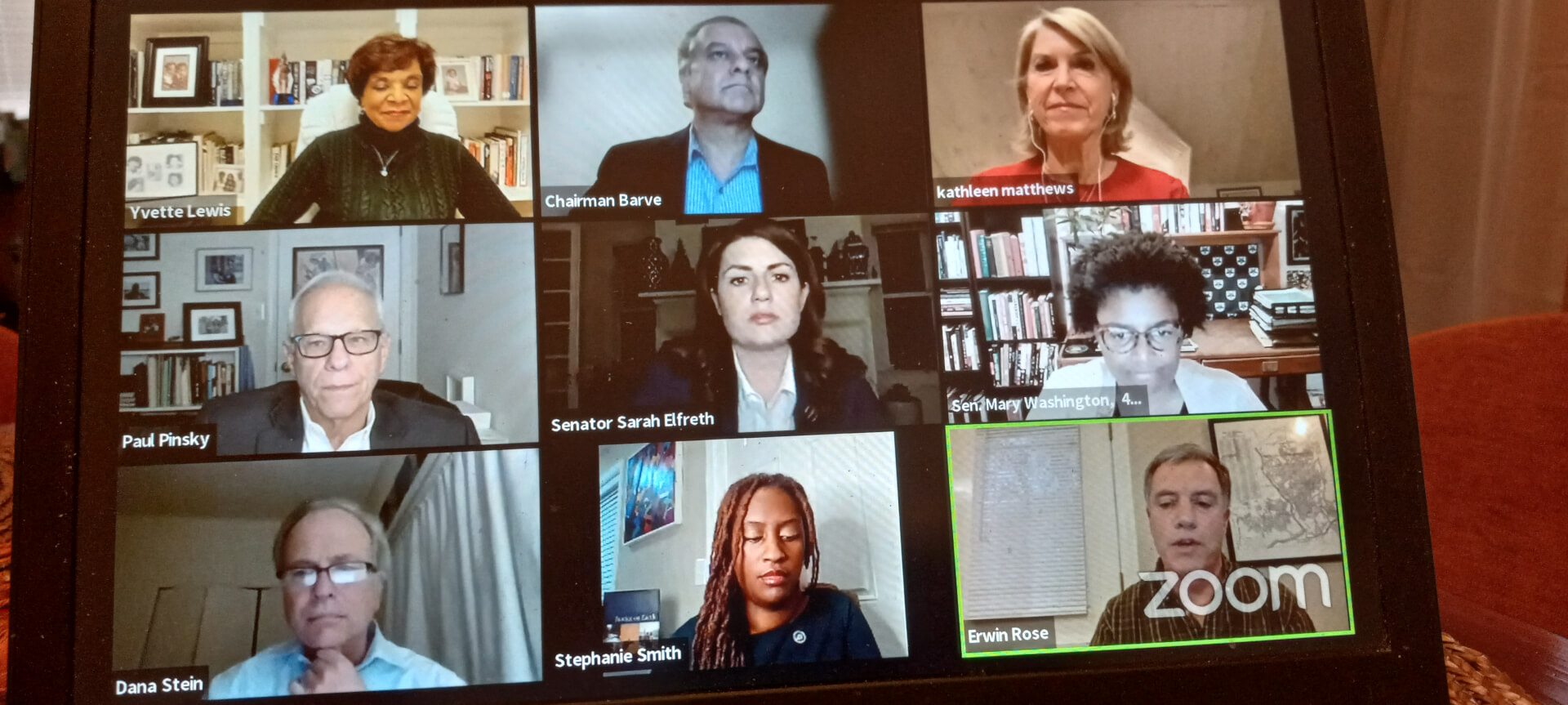Pinsky, Barve Vow to Move Climate Change Bill Quickly in 2022

The General Assembly will move quickly to pass a major climate bill early in the 2022 session — so lawmakers can promptly respond to a possible veto from Gov. Lawrence J. Hogan Jr. (R), legislative leaders said late last week.
During a virtual forum on climate policy hosted by the Maryland Democratic Party, Senate Education, Health and Environmental Affairs Chair Paul G. Pinsky (D-Prince George’s) and House Environment and Transportation Chair Kumar P. Barve (D-Montgomery) — whose impasse in the closing hours of this year’s legislative session sunk a major climate bill — vowed to swiftly pass similar legislation next year. And both said they are close to agreeing on major provisions for the bill after intense negotiations since the 2021 session ended in mid-April.
Both Barve and Pinsky acknowledged that the legislature would have to pass a climate measure quickly in 2022, the final year of the four-year legislative term, to provide an opportunity for the House and Senate to override a gubernatorial veto. If a climate bill passes late in the session, Hogan can wait to pass judgment until after the session is over — and a post-session veto would rob the legislature of the opportunity to override it. Instead, lawmakers would have to start from scratch and reintroduce the bill in the next legislative term, which begins in 2023.
“I hope Governor Hogan is going to support the bill, but I’m not going to bet the house on it,” Pinsky said. “This is very important. We can’t wait. The governor has not been an asset [on climate], he’s been a liability.”
Pinsky and Barve glossed over their differences that doomed the bill earlier this year and did not discuss the minute details of the legislation they’re putting together now. But both said it would contain aggressive cuts in greenhouse gas emissions goals, major boosts in electric vehicle infrastructure, and stringent green building standards, and prioritize environmental justice.
“It’s unique in that it sets broad goals — 60% [greenhouse gas] reductions — but it also offers concrete actions,” Pinsky said.
The Maryland Democrats’ conversation on climate change, which featured six Annapolis lawmakers, took place on the same day that the Abell Foundation in Baltimore released a report suggesting that Maryland is slipping as a leader in climate change policy. The report compared Maryland’s record unfavorably with Massachusetts, another state of roughly the same size with a centrist Republican governor and Democratic supermajorities in the legislature.
Maryland Secretary of the Environment Ben Grumbles pushed back on the Abell study, calling it incomplete and saying it ignored several important executive actions taken by the Hogan administration.
‘We have to pass legislation…that takes us to the next level’
All six of the lawmakers on the Maryland Democrats’ panel said evidence of a warming planet is everywhere in the state, with potentially dire consequences for a range of constituencies. And all said the state government’s approach to address climate change must be urgent and multi-faceted.
“We have to pass legislation in Annapolis that takes us to the next level to further cut carbon emissions in a wide variety of sectors,” said Del. Dana M. Stein (D-Baltimore County), the vice chair of the Environment and Transportation panel.
Sen. Mary L. Washington (D-Baltimore City) noted that different Maryland jurisdictions have endured temperature extremes, both high and low, in recent years, along with record rainfall and, in some cases, dramatic drought.
“Parts of our state are getting much wetter,” she said. “Parts of our state are getting much drier. Parts of our state are getting much hotter and parts of our state are getting cold. So it’s clear our constituents want us to move legislation that will have a statewide impact.”
Sen. Sarah K. Elfreth (D-Anne Arundel), whose district has been hammered by record flooding, tornadoes and coastal erosion, said she would push again for legislation to create a chief resiliency officer within state government, considering all the agencies that are currently involved in implementing climate policy.
“We really need one czar, one office, that is coordinating our response,” Elfreth said.
Del. Stephanie M. Smith (D-Baltimore City) said she worried about the potential detrimental health impacts of climate change on the state’s poorest communities, noting that the hottest spots in the state, with scant tree canopies, are often in inner-city neighborhoods “where any underlying health conditions will be exacerbated by the heat.”
Smith, who spent several years as a general counsel for Earthjustice, a national environmental group, lamented that much of environmental policy progress of the Obama administration was dismantled by the Trump administration, but said some of those policies are being restored by President Biden.
“To be frank, it’s been horrifying seeing all the work undone that I worked on over the past four years, by the previous administration,” she said. “So it’s good to have a partner in the White House.”
Barve said that even with an ambitious legislative climate agenda for the year ahead, lawmakers must prepare to continue working the issue.
“This isn’t just the end of the conversation. It’s really the beginning of the conversation,” he said.
And Barve argued “it’s important to understand” that Maryland has “a long history of leadership” on climate policy — from upping greenhouse gas reduction goals several times to banning offshore oil development to banning fracking of natural gas.
‘Massachusetts sped up and Maryland slowed down’
It’s Maryland’s leadership position on climate matters that is the focus of the new Abell Foundation study, which suggested that while the state was once a leader in aggressively tackling climate change, it has slipped some in recent years.
The report was written by Tom Peterson, president and CEO of the nonprofit Center for Climate Strategies and an adjunct professor at the Johns Hopkins University Energy Policy and Climate program, and Rex Hazelton, an energy, environment and transportation professional. The study compares Maryland and Massachusetts and concludes that Maryland is falling behind in six broad areas:
- Targets and limits;
- Economic and environmental justice systems;
- A whole of government approach;
- Comprehensive policies and measures;
- Matching implementation mechanisms; and
- Measurement and verification systems.
“Review of actions in each state indicate that Massachusetts and Maryland were on similar paths to advancement through 2016 but diverged as Massachusetts sped up and Maryland slowed down, although Massachusetts also faces shortfalls,” the study authors write. “To close gaps, systematic responses are needed through a combination of executive and legislative actions without delay. Maryland has the potential to re-establish itself as a national leader on climate change but must take immediate, comprehensive, and sustained new actions.”
The authors recommend a series of policy initiatives that Maryland ought to implement to regain more prominence as a climate leader, including:
- Establishment of economy-wide and sector-level emissions reductions targets and limits through 2050 for net-zero emissions with transitional five-year targets.
- Elevation of economic and environmental justice goals within state agencies and programs.
- Establishment of a centralized executive authority to oversee the climate change mitigation and adaptation across state agencies.
- Removal of policy barriers, such as anti-competitive renewable energy siting requirements.
- Accelerated implementation of recommendations from the Maryland Climate Change Commission to move past study to action, including increased transparency and public involvement.
- Establishment of public and private sector sources of funding to match climate change mitigation and adaptation programs at full program and market scales.
- Improved measurement systems, including application of the social cost of carbon and other greenhouse gases.
In a statement provided to Maryland Matters, Grumbles, the state environment secretary, said Abell’s policy paper was “useful in laying out broad areas for climate governance and accountability, and we appreciate that.” But, he argued, “the paper could have been a more compelling and complete critique if it had included more executive branch actions and also some objective criteria for specific numeric grades in each category.”
Grumbles said the study appeared to overlook some Hogan administration initiatives, including a 2030 greenhouse gas reduction plan issued earlier this year to get the state to a 50% reduction by 2030; 2019 task force recommendations on renewable energydevelopment and siting; the state’s agreement with Virginia and North Carolina to promote the development of offshore wind energy; the state’s “early leadership” on banning fracking and hydrofluorocarbons; and numerous other actions, including “consistently fightingenvironmental rollbacks at the federal level over the last 4 years.”
Grumbles expressed admiration for Massachusetts’ climate advances and said he and his colleagues confer regularly with officials from the Bay State.
“Maryland continues to be one of the nation’s leaders on climate, including greenhouse gas reduction and community resiliency, but we have much more to do and with an added sense of urgency,” he said.





 Creative Commons Attribution
Creative Commons Attribution